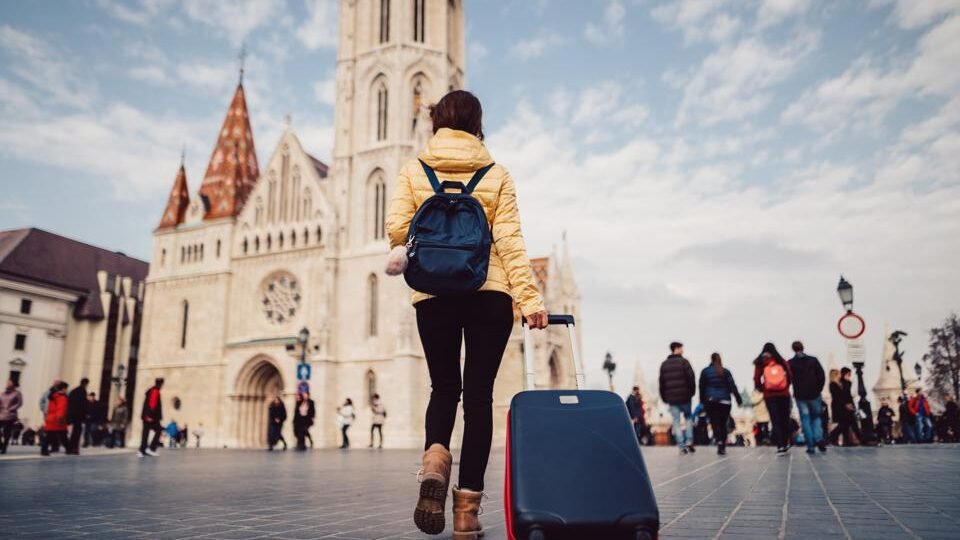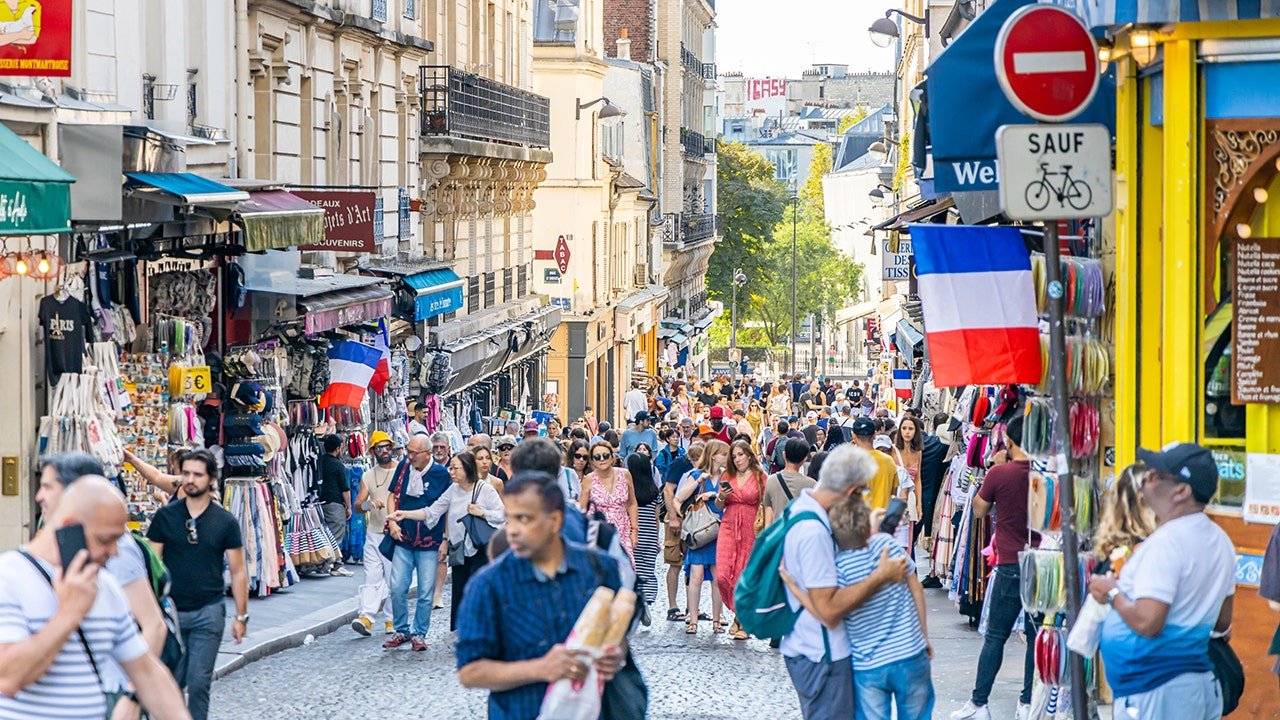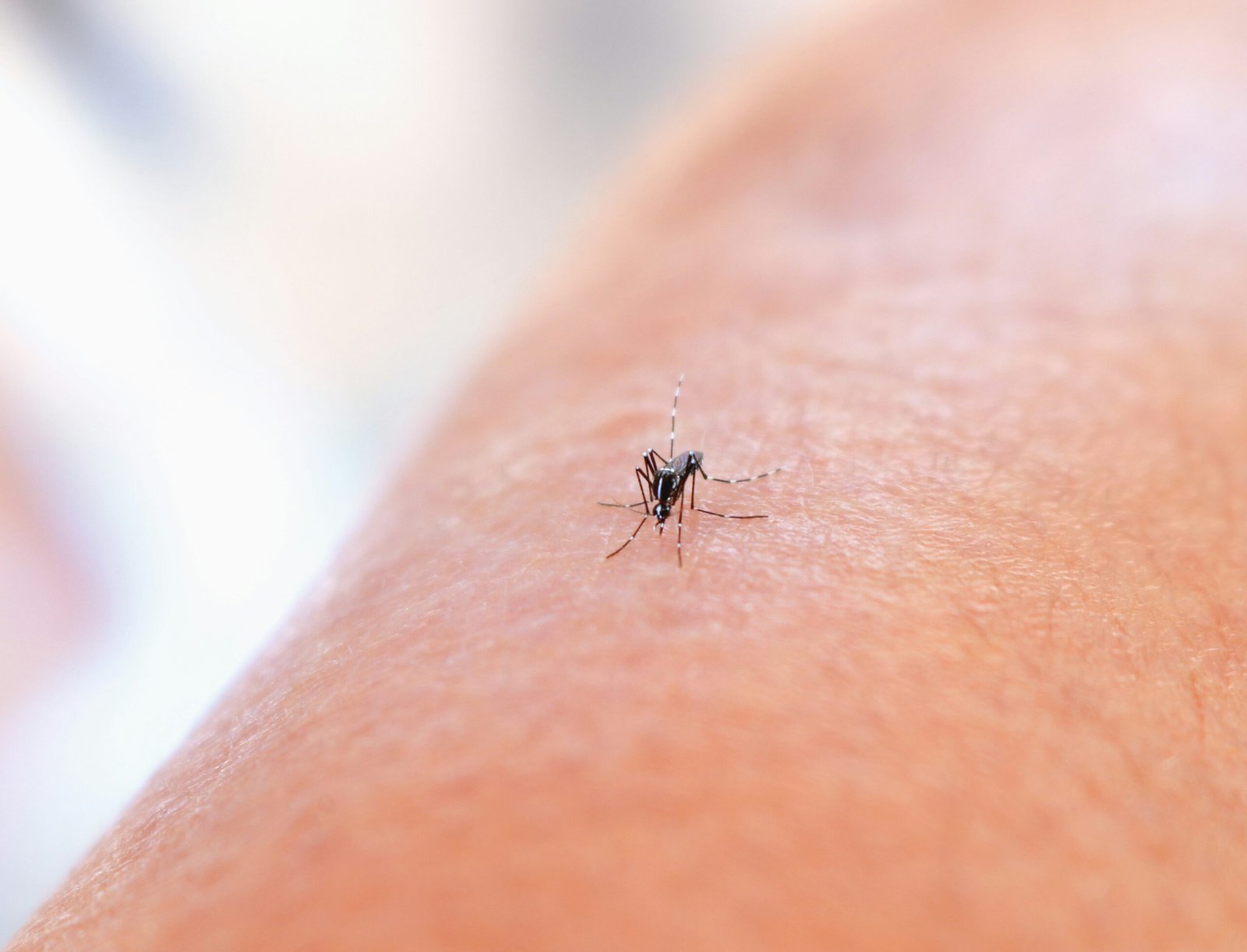Tips & Advices
Travel Insurance for a Student Abroad – Forbes Advisor

Editorial Note: We earn a commission from partner links on Forbes Advisor. Commissions do not affect our editors’ opinions or evaluations.
Key Takeaways
- There are two main forms of student travel insurance: standard travel insurance and global health plans.
- Both offer 24/7 emergency assistance, including medical referrals, emergency evacuation, and translation services.
- Study abroad programs may require travel insurance, so understand what the school will provide vs. what you may need to buy on your own.
Being immersed in another culture while earning college credit can be a transformative experience that enriches academic and personal growth. But no amount of intellectual prowess can prevent things from going wrong during a trip. Let’s say your student is seriously injured in a biking accident. Or they have to fly back to the U.S. early because of an emergency back home.
Buying student travel insurance is a smart move if you want a financial safety net for these types of unexpected scenarios. Travel insurance can pay for medical bills, trip delays and interruptions, and other expenses associated with unforeseen problems during the trip. It can also prevent you from losing your trip investment if you have to cancel.
Types of Travel Insurance for Students
Travel insurance for students generally comes in two forms:
- Standard travel insurance plans are suitable for many students and cover common pre- and post-departure problems all travelers may face, such as cancellations and delays.
- You can also buy student travel insurance plans that serve as short-term international health plans and have modest coverage for unexpected post-departure events, such as interruptions and delays.
Differences Between Travel Insurance and International Student Health Plans
Whether standard travel insurance or an international health plan is best for your student primarily depends on the trip’s length and the amount of medical coverage they need.
Standard Policies: Study Abroad Travel Insurance
Standard travel insurance policies are ideal for short-term trips, such as when your student is away for less than three months, and for those who only need medical coverage for emergencies. These policies have more generous coverage for pre- and post-departure problems than global health plans.
Here are details on what travel insurance covers.
Examples of the Best Travel Insurance for Students
Here are some top-rated policies from our rankings of the best travel insurance companies that are suitable for students:
- Atlas Journey Elevate. This policy from WorldTrips is competitively priced compared to other top-rated plans and provides $250,000 in medical expense coverage and $1 million in medical evacuation coverage. It has a short five-hour waiting period for coverage for travel delays and includes coverage for adventure sports, “interruption for any reason” and CFAR upgrades. IFAR partially reimburses you if you cut a trip short for a reason listed in the policy.
- iTravelInsured LX. This policy from IMG has $500,000 in travel medical expense coverage and $1 million in medical evacuation coverage. You also get $50,000 in non-medical evacuation coverage and $10,000 for search and rescue. It offers CFAR and IFAR upgrades.
- Luxe Plan. This policy from PrimeCover provides $250,000 in medical expense coverage and $1 million in medical evacuation coverage. It includes $100,000 in non-medical evacuation benefits. The Luxe policy reimburses 200% of costs for trip interruption claims, exceeding the 150% offered by many competitors. It offers IFAR and CFAR upgrades.
Global Health Plans: International Student Travel Insurance
Global health plans work similarly to U.S. health plans. They have deductibles, copays and coinsurance. They also have higher medical coverage limits than standard travel plans. For example, you can find policies with unlimited coverage or in the millions.
They’re a good fit for a student if you want wellness and routine medical coverage in addition to emergency care. They are also worth considering if a student is away for an extended period, such as three or more months. You can find policies that cover shorter trips, but many global health plans only cover trips of 90 days or more.
Global health policies typically cover a wide range of issues like a home-based health plan. These can include:
- Ambulance service
- Doctor visits
- Emergency room care
- Intensive care
- Lab work and X-rays
- Many cover mental healthcare, but not all
- Physical therapy
- Prescriptions
- Many cover preventive care, such as physicals, but not all
- Urgent care and walk-in clinic visits
- Vaccinations
Examples of International Health Plans for Students
Navigator For Students
This plan from GeoBlue requires a trip duration of at least three months. Here are some key benefits:
- Alcohol impairment-related incidents are covered.
- Collegiate sports activities are covered.
- Contraceptive services and supplies are covered.
- In-patient and out-patient benefits for both mental health and substance abuse; the plan deductible is waived and there is no limit on the number of visits.
- Meets the F1 and J1 Visa requirements.
- Offers an unlimited annual and lifetime medical maximum and $250,000 in medical evacuation coverage.
IMG Patriot Lite and Patriot Platinum Plans
The Patriot plans from IMG require a minimum trip duration of only five days. However, they do not cover expenses for treating mental health disorders.
The Patriot Lite policy provides up to $1 million in medical expense coverage and $1 million in medical evacuation coverage. The Platinum plan offers the choice of $1 million, $2 million, $5 million or $8 million in medical expense coverage. The Platinum policy also includes $25,000 in evacuation benefits for non-life-threatening medical incidents.
StudentSecure Smart, Budget, Select and Elite Plans
The StudentSecure policies from WorldTrips meet J1 visa requirements and have a zero deductible. They require a trip duration of at least 30 days.
The series provides the following maximum medical and medical evacuation limits:
- Smart: $200,000 in medical, $50,0000 evacuation
- Budget: $500,000, $250,000 in evacuation
- Select: $1 million, $300,000 in evacuation
- Elite: $5 million, $300,000 in evacuation
The Elite and Select plans cover collegiate sports. The Elite, Select and Budget plans cover mental health disorders. The Smart plan also covers mental health disorders, but excludes treatment for drug and alcohol abuse. Only the Elite plan covers preventive care.
Does Student Travel Insurance Cover Tuition?
Travel insurance doesn’t cover the cost of tuition for students studying abroad.
If you make a trip cancellation claim, you will not be compensated for lost tuition. Therefore, don’t include tuition in your insured trip cost when buying a policy.
However, you may be reimbursed for accommodations if lodging is billed separately from tuition. If that’s the case, you would include that amount in the trip cost you’re insuring.
Before you buy a policy, it’s best to call the travel insurance company to confirm whether student accommodations and tuition can be reimbursed.
Can Travel Insurance Help Find a Doctor if My Child Gets Sick or Injured?
Yes, standard travel insurance policies come with a 24-hour emergency assistance hotline that can assist in arranging medical care and payments. The number is usually listed on the policy or can be found at the company website. Other services typically provided include:
- Arranging medical evacuation
- Emergency cash transfer
- Emergency message relay
- Emergency translation
- Legal assistance
- Medical referrals
- Payment guarantees for medical facilities abroad
- Prescription replacement
Global health plans also provide 24/7 assistance. For example, GeoBlue plans have 24/7 hotline, web, mobile and telemedicine support. It also has the following services:
- Destination health and security information and news alerts
- Direct insurance billing with some foreign providers, so you don’t have to file a claim
- Drug, medical terms and phrases translation guide
- Equivalency tools for medication doses
- Global TeleMD app that allows you to make same-day virtual telemedicine appointments
- Personal health management tools
- Profiles of notable clinics and pharmacies worldwide
Is It Mandatory for Students Studying Abroad to Have Travel Insurance?
Whether or not travel insurance for a study abroad trip is mandatory depends on the school’s program. The school may require travel insurance covering a student’s trip outside the U.S.
Some schools may include travel insurance as part of the study abroad program, but the policy provided might only cover medical expenses.
Be sure to contact the school and find out the details about what is and isn’t required and what’s included in the school-provided policy when preparing for a study abroad trip.
Student Travel Insurance Frequently Asked Questions (FAQs)
Does student travel insurance cover mental health?
Standard travel insurance policies usually exclude mental and psychological issues from coverage unless there’s a diagnosis or hospital stay. For example, a licensed medical professional must diagnose or treat the student for benefits to apply. Some policies require you to be hospitalized for a certain period of time—usually at least three days—to qualify for travel medical expense coverage for mental or psychological issues.
Global health plans typically cover mental and psychological health issues.
When is the best time to buy student travel insurance?
The best time to buy travel insurance for a student is right after the trip is booked. For example, if you buy plane tickets for the trip, you’d want to purchase a policy within a week or two.
A significant advantage of buying travel insurance right after you book a trip is getting the maximum amount of time for cancellation coverage. You also qualify for time-sensitive upgrades you may want to buy, such as CFAR and IFAR. Additionally, you can be eligible for a pre-existing medical condition exclusion waiver.
Is travel insurance worth it for studying abroad?
Yes, travel insurance is worthwhile for student trips abroad if the program does not include coverage. At the very least, you’ll want travel medical insurance because your U.S. health plan may have no or limited coverage in other countries.
However, travel insurance may be redundant if the school provides travel insurance benefits as part of the program. Still, that coverage may be limited to post-departure problems such as medical expenses and interruptions. Assess what is and isn’t being provided by the program to determine if you need to buy a separate policy.
Tips & Advices
How to avoid Paris pickpockets with safety tips from travelers and embassy

NEWYou can now listen to Fox News articles!
When it comes to traveling abroad, some people may be worried about their safety and want to keep their guard up.
In the “r/ParisTravelGuide” forum on Reddit, a traveler asked others for advice on pickpockets.
“My family will be traveling to Paris next month,” the person wrote. “It will be our first time visiting Europe, and we are very excited — but also a bit nervous.”
LOCALS RANT THEIR NEIGHBORHOOD NOW ‘LIKE DISNEYLAND’ AS POST-OLYMPICS TOURISM SURGES
The user added, “We tend to look quite innocent, and we’re worried we might be easy targets for pickpockets. We won’t have a tour guide and will be managing everything on our own.”
Others on the platform took to the comments section to share advice and their own experiences.
Each year some 2,000 Americans report their passports stolen or lost in Paris. (ALAIN JOCARD/AFP via Getty Images)
“Just know they target tourists,” wrote one person. “They only hang out in tourist areas and by your clothing it will be obvious you are not Parisian. They never bother me and I’ve never been robbed nor has a single person I know.”
Another user shared, “In the last 2 years, I’ve stopped two pickpockets in the subway. In one case, they were reaching into someone’s backpack and in the other for a phone in a loose back pocket. The strategy is to keep [your] items in places that are difficult to access.”
Said a different person, “Stay alert in touristy areas, keep your bag in front of you on the Metro, and avoid engaging with strangers who approach you (anyone).”
AMERICAN OFFICIALS WARN NIGERIAN WOMEN AGAINST BIRTH TOURISM: ‘THIS IS NOT PERMITTED’
One person wrote, “Be mindful. Carry bags that close, wear a cross-body bag, keep all zippers closed, don’t flash cash or jewelry. And if a stranger approaches you to hold something or offers to take your photo, walk away.”
Said yet another person, “I’m staggered how many tourists I see on the Metro with a backpack on. Makes it so easy for pickpockets to steal from them.”
A Redditor wrote, “The [number] of people I watched on their phones by the doors of the trains was staggering and does present an opportunistic grab-and-run scenario. Don’t do that.”
Both the U.S. Embassy and the Reddit community have provided pickpocket prevention strategies for tourists who travel to Paris. (iStock)
Each year some 2,000 Americans report their passports stolen or lost in Paris, according to the U.S. Embassy in France.
The Embassy and Consulate in France have a whole page dedicated to “Pickpockets in Paris.”
Travelers are advised not to bring along more than $50 to $60 in cash.
Says the site, “The first rule of thumb is don’t have anything more in your wallet than you are willing to lose.”
The embassy also advises bringing only one credit card or ATM card along and only one piece of identification.
For more Lifestyle articles, visit foxnews.com/lifestyle
Travelers are also advised not to bring along more than $50 to $60 in cash.
Tourist spots such as the Eiffel Tower, Notre Dame and the Champs-Elysées are areas where visitors are most likely to be pickpocketed, according to the embassy.
“The first rule of thumb is don’t have anything more in your wallet than you are willing to lose.” (iStock)
“Americans in Paris should be particularly alert to thieves who commonly work near tourist attractions such as museums, monuments, restaurants, hotels, beaches, trains, train stations, airports, subways and target vehicles with non-local license plates,” the embassy cautions.
The embassy also discusses the different tactics pickpocketers use, whether on the street or on public transportation.
“Two or more people will approach you and ask for directions.”
If riding the Metro, the embassy says that “the most popular is the crush-and-grab. You will be swarmed by several people all trying to get on or off.”
“While they are pushing you, they are also picking your pockets,” notes the advisory.
CLICK HERE TO SIGN UP FOR OUR LIFESTYLE NEWSLETTER
“Another trick is to grab the purse of someone sitting right by the door and to hop off just as the doors are closing.”
Pickpocketers most frequently use a distraction technique on the streets.
“Two or more people will approach you and ask for directions, try to sell you stuff or just crowd you. While you are occupied with one person, another is picking your pocket,” the embassy says.
CLICK HERE TO GET THE FOX NEWS APP
Travelers should also watch out for something getting spilled or thrown on them, as a criminal may offer to help clean up while another person picks your pocket.
The Consular Section of the Embassy has information on how to replace certain items which have been stolen or lost.
Tips & Advices
America’s Best Bucket List Destinations and How To Protect Them

ST. PETERSBURG, Fla., Aug. 5, 2025 /PRNewswire/ — Like temperatures across the nation, domestic travel is on the rise this summer, with more travelers opting for trips closer to home. Squaremouth, the nation’s largest travel insurance marketplace, reports that domestic trips account for 16% of all travel insurance sales this summer, up from just 11% this spring.
As more Americans prioritize domestic trips, Squaremouth breaks down the country’s top bucket list destinations and explains how travel insurance can provide valuable peace of mind for each trip type.
Iconic Cities
World-famous destinations like New York, San Francisco, and Las Vegas offer endless entertainment, sightseeing, and culinary delights. However, these high-traffic cities are synonymous with busy airports and packed runways, making them prone to flight disruptions.
How Travel Insurance Can Help:
- Trip Cancellations: Can reimburse your non-refundable trip costs if you’re forced to cancel your trip for reasons out of your control.
- Flight Delays: Covers food, accommodation, and local transportation expenses if your flight is significantly delayed.
- Missed Connections: Covers the cost to make new travel arrangements if a delay results in you missing a connecting flight later in your travel itinerary.
National Parks
From the Grand Canyon to Yellowstone, Yosemite to Acadia, America’s national parks offer stunning landscapes, wildlife encounters, and endless adventure. However, visiting these parks also offers unpredictable weather conditions, remote locations, and often rugged terrain.
How Travel Insurance Can Help:
- Weather Protection: Provides reimbursement for your travel expenses if your trip is cancelled, interrupted, or delayed by inclement weather.
- Medical Evacuations: Covers the cost to be airlifted to a nearby medical facility if you get injured or severely ill while exploring remote locations.
- Adventurous Sport Coverage: Some policies offer unique protection to travelers who get injured while rock climbing, rafting, or participating in other high-risk activities.
Family Destinations
Family-friendly destinations like Disney World, San Diego, and Chicago are surging in popularity among travelers looking to create lasting memories with their children. But, as many parents know, traveling with young children can mean a higher chance of illness, last-minute itinerary changes, and other surprises.
How Travel Insurance Can Help:
- Medical Expenses for Children: Covers the cost of unexpected hospital stays, doctor visits, prescription medications, and other medical expenses during a trip.
- Emergency Assistance Services: Offers 24-hour emergency assistance to help refer care, coordinate medical evacuations, and provide other time-sensitive services.
- Concierge Services: Some plans include a dedicated concierge service that can help you purchase last-minute amusement park tickets, dinner reservations, and more.
Historic Charm
Rich in history and culture, destinations like Washington D.C., Philadelphia, and New Orleans provide an in-depth look into American history. From museums to tours, many of the attractions found in these cities require advanced planning and prepaid reservations, resulting in lost expenses if your trip gets canceled or interrupted.
How Travel Insurance Can Help:
- Booking Protection: Since tours and tickets are often prepaid, your policy may reimburse these non-refundable bookings if you’re forced to cancel your trip.
- Trip Interruption: Reimburses unused prepaid trip expenses if a family emergency or severe weather event forces you to end your trip early.
About Squaremouth
Squaremouth is a trusted name in the travel insurance industry, offering comprehensive, transparent, and competitive coverage to travelers for 20 years through its digital platform. With the largest portfolio of travel insurance carriers and products in the U.S., Squaremouth has insured over 4 million travelers.
Media Contact
Steven Benna
[email protected]
SOURCE Squaremouth
Tips & Advices
Dengue surge in Samoa prompts swift New Zealand response – Insurance Business America

Dengue surge in Samoa prompts swift New Zealand response Insurance Business America
Source link
-

 Brand Stories2 weeks ago
Brand Stories2 weeks agoBloom Hotels: A Modern Vision of Hospitality Redefining Travel
-

 Brand Stories2 weeks ago
Brand Stories2 weeks agoCheQin.ai sets a new standard for hotel booking with its AI capabilities: empowering travellers to bargain, choose the best, and book with clarity.
-

 Destinations & Things To Do2 weeks ago
Destinations & Things To Do2 weeks agoUntouched Destinations: Stunning Hidden Gems You Must Visit
-

 Destinations & Things To Do1 week ago
Destinations & Things To Do1 week agoThis Hidden Beach in India Glows at Night-But Only in One Secret Season
-

 AI in Travel2 weeks ago
AI in Travel2 weeks agoAI Travel Revolution: Must-Have Guide to the Best Experience
-

 Brand Stories1 month ago
Brand Stories1 month agoVoice AI Startup ElevenLabs Plans to Add Hubs Around the World
-

 Brand Stories4 weeks ago
Brand Stories4 weeks agoHow Elon Musk’s rogue Grok chatbot became a cautionary AI tale
-

 Brand Stories2 weeks ago
Brand Stories2 weeks agoContactless Hospitality: Why Remote Management Technology Is Key to Seamless Guest Experiences
-

 Asia Travel Pulse1 month ago
Asia Travel Pulse1 month agoLooking For Adventure In Asia? Here Are 7 Epic Destinations You Need To Experience At Least Once – Zee News
-

 AI in Travel1 month ago
AI in Travel1 month ago‘Will AI take my job?’ A trip to a Beijing fortune-telling bar to see what lies ahead | China
